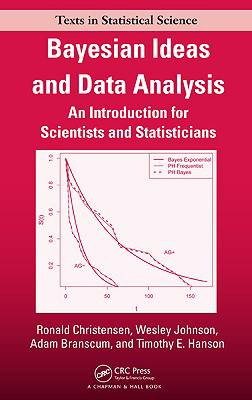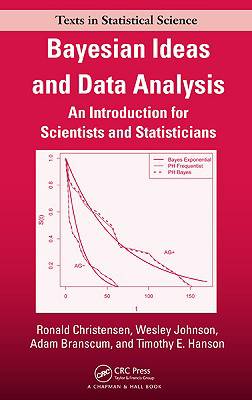
- Afhalen na 1 uur in een winkel met voorraad
- Gratis thuislevering in België vanaf € 30
- Ruim aanbod met 7 miljoen producten
- Afhalen na 1 uur in een winkel met voorraad
- Gratis thuislevering in België vanaf € 30
- Ruim aanbod met 7 miljoen producten
Bayesian Ideas and Data Analysis
An Introduction for Scientists and Statisticians
Ronald Christensen, Wesley Johnson, Adam Branscum, Timothy E HansonOmschrijving
Emphasizing the use of WinBUGS and R to analyze real data, Bayesian Ideas and Data Analysis: An Introduction for Scientists and Statisticians presents statistical tools to address scientific questions. It highlights foundational issues in statistics, the importance of making accurate predictions, and the need for scientists and statisticians to collaborate in analyzing data. The WinBUGS code provided offers a convenient platform to model and analyze a wide range of data.
The first five chapters of the book contain core material that spans basic Bayesian ideas, calculations, and inference, including modeling one and two sample data from traditional sampling models. The text then covers Monte Carlo methods, such as Markov chain Monte Carlo (MCMC) simulation. After discussing linear structures in regression, it presents binomial regression, normal regression, analysis of variance, and Poisson regression, before extending these methods to handle correlated data. The authors also examine survival analysis and binary diagnostic testing. A complementary chapter on diagnostic testing for continuous outcomes is available on the book's website. The last chapter on nonparametric inference explores density estimation and flexible regression modeling of mean functions.
The appropriate statistical analysis of data involves a collaborative effort between scientists and statisticians. Exemplifying this approach, Bayesian Ideas and Data Analysis focuses on the necessary tools and concepts for modeling and analyzing scientific data.
Data sets and codes are provided on a supplemental website.
Specificaties
Betrokkenen
- Auteur(s):
- Uitgeverij:
Inhoud
- Aantal bladzijden:
- 516
- Taal:
- Engels
- Reeks:
Eigenschappen
- Productcode (EAN):
- 9781439803547
- Verschijningsdatum:
- 6/07/2010
- Uitvoering:
- Hardcover
- Formaat:
- Genaaid
- Afmetingen:
- 175 mm x 254 mm
- Gewicht:
- 1065 g

Alleen bij Standaard Boekhandel
Beoordelingen
We publiceren alleen reviews die voldoen aan de voorwaarden voor reviews. Bekijk onze voorwaarden voor reviews.











